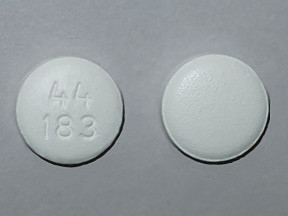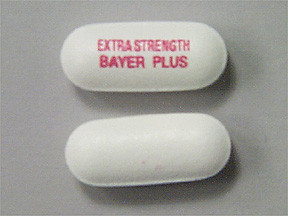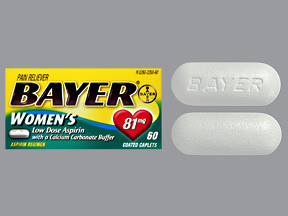ASPIRIN, BUFFERED WITH CA/AL/MG ANTACID - ORAL
PHONETIC PRONUNCIATION:
COMMON BRAND NAME(S): Ascriptin, Bufferin
GENERIC NAME(S): aspirin/calcium carbonate/magnesium
Uses
USES: This product is a combination of aspirin and an antacid (such as calcium carbonate, aluminum hydroxide, or magnesium oxide). The antacid helps reduce heartburn and upset stomach that aspirin may cause. Aspirin is used to reduce fever and relieve mild to moderate pain from conditions such as muscle aches, toothaches, common cold, and headaches. It may also be used to reduce pain and swelling in conditions such as arthritis. Aspirin is known as a salicylate and a nonsteroidal anti-inflammatory drug (NSAID). It works by blocking a certain natural substance in your body to reduce pain and swelling. Consult your doctor before treating a child younger than 12 years. Your doctor may direct you to take a low dose of aspirin to prevent blood clots. This effect reduces the risk of stroke and heart attack. If you have recently had surgery on clogged arteries (such as bypass surgery, carotid endarterectomy, coronary stent), your doctor may direct you to use aspirin in low doses as a "blood thinner" to prevent blood clots.
How to use ASPIRIN, BUFFERED WITH CA/AL/MG ANTACID - ORAL
HOW TO USE: If you are taking this medication for self-treatment, follow all directions on the product package. If you are uncertain about any of the information, consult your doctor or pharmacist. If your doctor has directed you to take this medication, take it exactly as prescribed. Take this medication by mouth. Drink a full glass of water (8 ounces/240 milliliters) with it unless your doctor tells you otherwise. Do not lie down for at least 10 minutes after you have taken this drug. If stomach upset occurs while you are taking this medication, you may take it with food or milk. The antacid in this product may react with other medications (such as digoxin, iron, tetracycline antibiotics, quinolone antibiotics such as ciprofloxacin), preventing them from being fully absorbed by your body. Talk with your doctor or pharmacist about how to schedule your medications to prevent this problem. The dosage and length of treatment are based on your medical condition and response to treatment. Read the product label to find recommendations on how many tablets you can take in a 24-hour period and how long you may self-treat before seeking medical advice. Do not take more medication or take it for longer than recommended unless directed by your doctor. Use the smallest effective dose. Consult your doctor or pharmacist if you have any questions. If you are taking this medication for self-treatment of headache, seek immediate medical attention if you also have slurred speech, weakness on one side of the body, or sudden vision changes. Before using this drug, consult a doctor or pharmacist if you have headaches caused by head injury, coughing, or bending, or if you have a headache with persistent/severe vomiting, fever, and stiff neck. If you are taking this medication as needed (not on a regular schedule), remember that pain medications work best if they are used as the first signs of pain occur. If you wait until the pain has worsened, the medicine may not work as well. You should not take this medication for self-treatment of pain for longer than 10 days. You should not use this drug to self-treat a fever that lasts longer than 3 days. In these cases, consult a doctor because you may have a more serious condition. Tell your doctor promptly if you develop ringing in the ears or difficulty hearing. If your condition persists or worsens (such as new or unusual symptoms, redness/swelling of the painful area, pain/fever that does not go away or gets worse) or if you think you may have a serious medical problem, tell your doctor promptly.
Side Effects
Precautions
Interactions
Overdose
Images

- color
- white
- shape
- round
- imprint
- 44 183

- color
- white
- shape
- oblong
- imprint
- EXTRA STRENGTH BAYER PLUS
Reviews
Faq for ASPIRIN, BUFFERED WITH CA/AL/MG ANTACID - ORAL
- Aspirin, Buffered with Ca/Al/Mg Antacid - Oral is primarily used to relieve mild to moderate pain, reduce fever, and decrease inflammation. It is also often taken to prevent heart attacks, strokes, and blood clot formation.
- Aspirin is a nonsteroidal anti-inflammatory drug (NSAID) that works by reducing the production of certain chemicals in the body that cause pain, inflammation, and fever. The calcium, aluminum, and magnesium antacids help neutralize stomach acid and prevent digestive disturbances that can occur with aspirin use.
- The dosage may vary depending on the specific condition being treated and individual factors. It is important to follow the instructions provided by your healthcare provider or the medication label. Usually, adults can take 1 to 2 tablets every 4 to 6 hours, not exceeding 12 tablets in 24 hours.
- Yes, common side effects may include upset stomach, heartburn, nausea, vomiting, or diarrhea. Inform your healthcare professional if you experience more severe side effects like ringing in the ears, unusual bleeding or bruising, liver problems, or allergic reactions.
- No, aspirin is not recommended for children and teenagers under 18 years old due to the risk of Reye's syndrome. Additionally, individuals with certain medical conditions, such as asthma, bleeding disorders, or stomach ulcers, should consult their healthcare provider before taking this medication.
- Yes, aspirin can interact with various drugs, including blood thinners, corticosteroids, NSAIDs, anticoagulants, and certain medications used for diabetes, gout, or high blood pressure. It is important to inform your doctor about all the medications you are taking to avoid potential interactions.
- It is generally recommended to take aspirin with food or after meals to minimize the risk of stomach upset. However, follow the specific instructions provided by your healthcare professional or refer to the medication label.
- It is generally advisable to avoid consuming alcohol while taking aspirin. Alcohol can increase the risk of stomach bleeding and may reduce the effectiveness of the medication.
- If you miss a dose, take it as soon as you remember. However, if it is close to the next scheduled dose, skip the missed dose and continue with your regular dosing schedule. Do not double the dose to make up for a missed one.
Disclaimer
IMPORTANT: HOW TO USE THIS INFORMATION: This is a summary and does NOT have all possible information about this product. This information does not assure that this product is safe, effective, or appropriate for you. This information is not individual medical advice and does not substitute for the advice of your health care professional. Always ask your health care professional for complete information about this product and your specific health needs.

No Reviews Yet